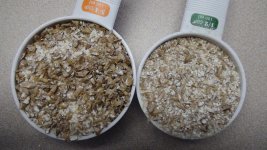econolinevan
Master Brewer
- Joined
- May 10, 2009
- Messages
- 55
- Reaction score
- 0
I've been brewing for a couple of years now. I have only six all grain batches under my belt, all in the last five months. Out of the six I have only been pleased with one of the beer's efficiencies out of the mash. I've tried several things to improve my mash efficiency, but still it seems a little eratic. Mash temperatures I think have been one of my biggest past nemesis, but I hope I've cured this problem with more reliable thermometer. I've always have had my grains crushed and mixed before being shipped to me. I'm wondering how big of a factor this practice can be in my brew efficiency. If I were to purchase the bc mill, is there a guide for grain/roller spacing? I'm thinking every grain probably has to be different and the roller gap has got to be set differently for each grain, right? I'm wondering if the suppliers I buy from actually take the time to do this. I remember getting started in home brewing and hearing you can just use a beer bottle and gently roll over your grains if you don't get them precrushed. I guess I need to be assured my brewing will improve before I can justify to myself and more importantly to my wife that investing in in the bc mill is a good thing. Advice from the masters?

